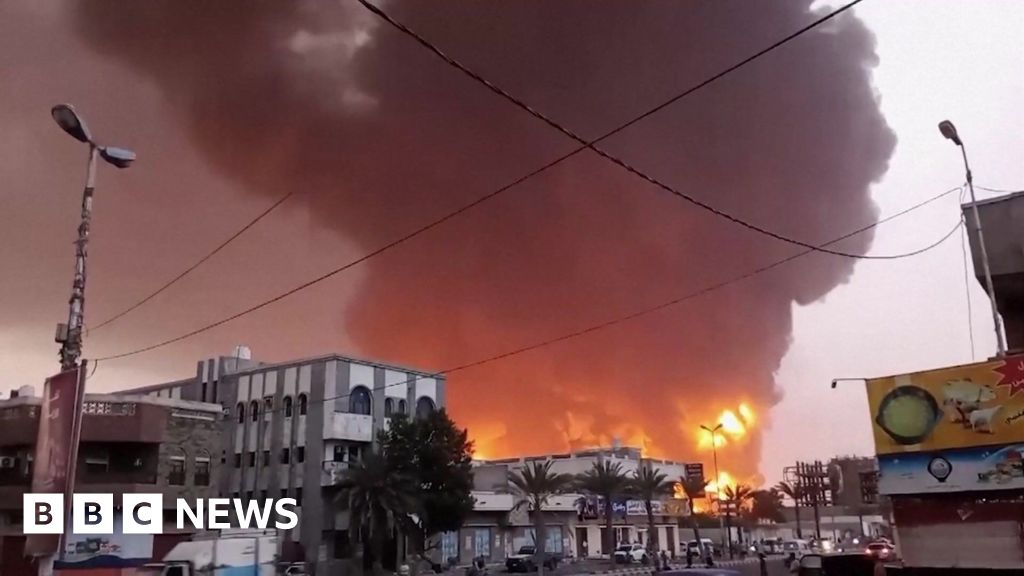- author, Tom Spender and Paul Adams
- role, BBC News
-
Israel carried out airstrikes on Yemen’s Houthi-controlled Red Sea port city of Hodeidah, a day after a Houthi-launched drone struck Tel Aviv.
Defense Minister Yoav Gallant said his country was seeking to send a message to the Houthis.
“The fires burning right now in Hodeidah are being seen across the Middle East and their importance is clear,” he said.
Houthi-linked media outlets said Saturday’s attack killed three people and wounded more than 80, with senior Houthi leader Mohammed Abdulsalam calling it a “brutal Israeli aggression in Yemen.”
The Israeli military said on Sunday morning that it had shot down a missile fired from Yemen before it entered Israeli airspace.
It added that an aviation alert had been sounded in the Israeli Red Sea port city of Eilat due to “possible falling debris.”
Abdulsalam said the Israeli attack was aimed at pressuring the Houthis to stop supporting Palestinians in the Gaza Strip, but that will not happen.
It is the first time Israel has responded directly to hundreds of Yemeni drone and missile attacks aimed at its territory in recent months.
Footage from Hodeidah showed large fires raging on Saturday evening. The Houthi regime in Sanaa said Israel had struck an oil storage facility near the coast and a nearby power station.
“After nine months of continuous air attacks on Israel by Yemen’s Houthi rebels, the IAF [Israeli Air Force] The warplanes carried out a massive operational strike against Houthi terrorist military targets in the area of the port of Hodeidah from more than 1,800 kilometers (1,118 miles) away. [1118miles)awayagainstHouthiterroristmilitarytargets”intheareaoftheportofHodeidah
“The IDF is capable of operating wherever necessary and will strike any force that endangers Israel,” the statement said, adding that Saturday’s operation was codenamed “Outstretched Arm.”
Gallant said Israeli warplanes attacked the group because it was harming Israelis.
“The Houthis have attacked us more than 200 times. The first time they tried to harm Israeli citizens we attacked them, and we will do so wherever it is needed,” he said.
Israeli Prime Minister Benjamin Netanyahu said Saturday evening after the attack that his country would defend itself with “all means.”
“Anyone who does us harm will pay a very heavy price for their acts of aggression,” he said in a televised address, claiming the port was an entry point for Iranian weapons.
He also said that the move had shown Israel’s enemies that there was no place it could not reach.
on friday Tel Aviv apartment attacked Israeli military officials said the missile was fired from an Iranian-made unmanned aerial vehicle (UAV) modified for long-range flight.
The Houthis said they carried out the attack and vowed to launch more.
The attack killed a 50-year-old man who had recently emigrated to Israel from Belarus and injured eight others.
An Israeli military official said the country’s defense forces had detected the drone but did not attempt to shoot it down due to “human error.”
So far, nearly all Houthi missiles and drones fired at Israel have been intercepted, and none are known to have reached Tel Aviv.
The Houthi Supreme Political Council, the group’s executive body, was reported to have told Houthi-run media on Saturday evening that there would be an “effective response” to the airstrikes.
Israel has never attacked the Houthis in Yemen, but the United States and Britain have been conducting airstrikes against the group for months and trying to stop them from attacking merchant ships in the Gulf of Aden and the Red Sea.
The Houthis initially Attacking ships linked to IsraelHowever, many of the vessels are not linked to Israel, and since the airstrikes began, the group has also targeted vessels linked to the UK and the US.


